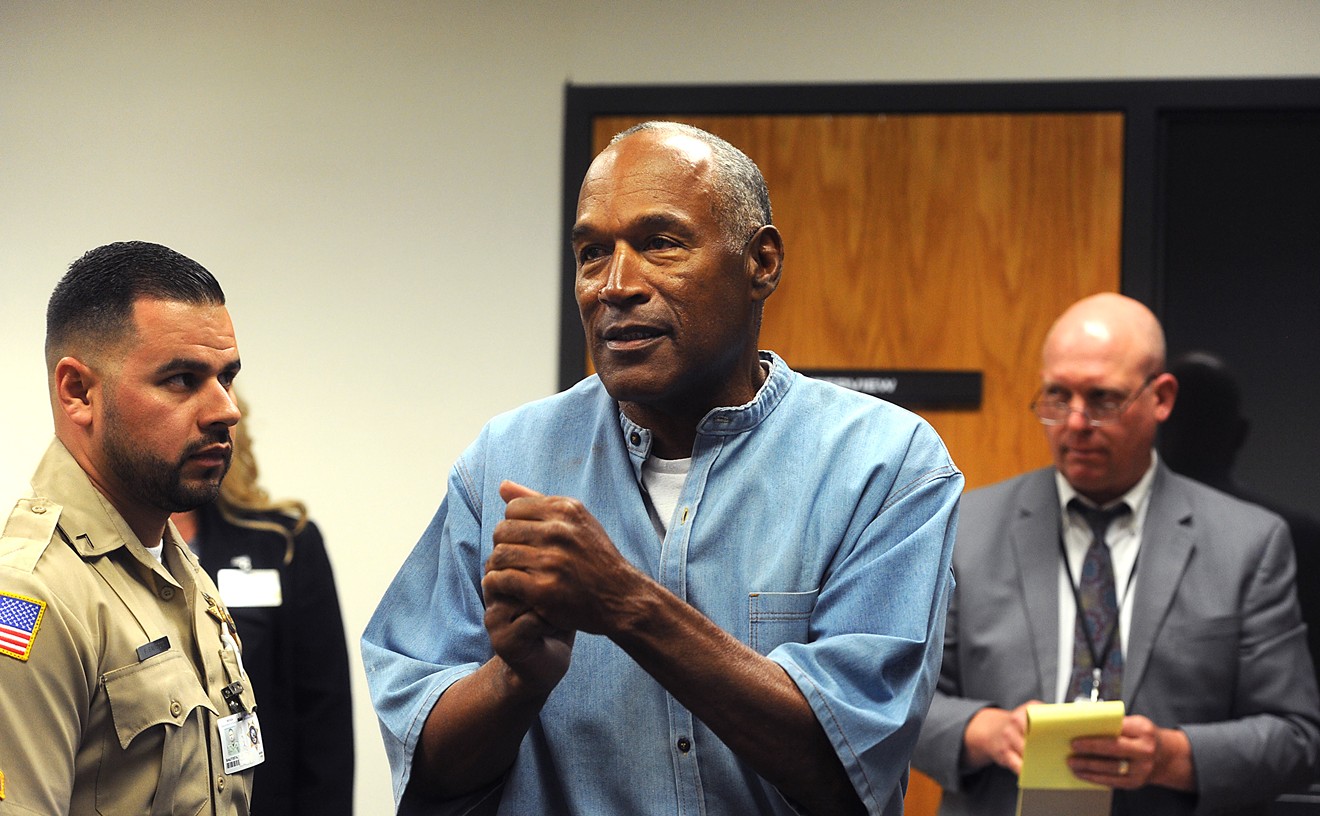The photo is reminiscent of a poster for The Sopranos. Three men dressed in natty suits with slicked-back hair saunter down a dimly lit, brick-paved alley. They leave little room to pass. It seems like they are intentionally blocking someone's path.
The pretty boy on the left scrunches his face as if to say, "You talking to us?" The tough guy in the middle buries his hands in his pockets as if hiding a Beretta. And the handsome little one struggles to catch up.
This triumvirate forms the heart of Cuban Miami's second most prominent family after the Diaz-Balarts, who have long dominated South Florida's voice in Congress. Miguel, Alex, and Renier Diaz de la Portilla have played powerful roles from Tallahassee to county hall for more than two decades.
"Everything they do is in lockstep," says political blogger Elaine de Valle, who has used the photo in at least three posts describing the brothers on her blog Political Cortadito. "They are like a three-headed monster."
The DDLPs — as they are nicknamed by friends and foes alike — have been in the news recently since eldest brother Miguel was re-elected last month to the state senate without competition.
Renier, the youngest, did two stints as a school board member and a brief term as a state house representative. He recently announced a run for judge against political newcomer and assistant Miami city attorney Veronica Diaz. Alex, who previously held a state senate seat, serves as Renier's paid campaign adviser. In addition to bearing a powerful family name, Renier has racked up endorsements from high-profile politicos such as state Rep. Erik Fresen, Miami Commissioner Marc Sarnoff, and county Commissioners Xavier Suarez and Juan Carlos Zapata.
"We need Renier Diaz de la Portilla on the bench," Zapata recently proclaimed in an endorsement pitch. "He has a proven track record of competence, openness, and fairness. That is why I know he will make an outstanding judge."
But questions abound about the brothers and their father, Miguel A. Diaz. They have been involved in controversies that started with allegations of drug dealing, continued to reckless driving and ethical lapses, and ended with staggeringly large campaign fines.
Renier is the just the latest target of DDLP critics like Julio Robaina, a former state representative from South Miami. "To be a judge, you need to have the utmost level of integrity," Robaina says. "I think he falls way short."
Though Renier did not respond to two voicemail messages requesting comment and Alex could not be located, Miguel calls his family "good public servants. We are united in our love for each other and our dedication to public service... I think that there are a number of people with political agendas who like to come after us."
The DDLP family history can be traced to the early days of the Cuban revolution, when Miguel Sr. and his wife, Fabiola de la Portilla, met while working with student groups against then-dictator Fulgencio Batista. After Batista was ousted and Fidel Castro took over in 1959, the couple became disillusioned again. They fled Matanzas for Miami, where Miguel was born three years later. Fabiola gave birth to Alex and Renier in 1964 and 1971.
To make ends meet, the couple started De Mattress, a family business that still exists today. Miguel Sr. also had a side gig as a CIA employee, according to a 2000 Miami Herald profile of the family. His spook duties entailed sneaking into Cuba to wreak havoc in the runup to the Bay of Pigs invasion. Like many Cubans involved in the mission, Miguel Sr. blamed its failure on Democrat John F. Kennedy. That cemented the family's loyalty to the Republican Party.
By the early 1980s, after the CIA stopped using him, Miguel Sr. was accused of drug trafficking. A federal grand jury in 1982 indicted the family patriarch for being part of a Panama City marijuana-smuggling ring, two years after Miguel and Alex worked as volunteers on the Reagan-Bush presidential campaign. (The drug charges were eventually dropped in 1992 because of the government's failure to afford a speedy trial.)
Once their father was cleared, the brothers set out to fulfill their political ambitions. And in the beginning, they seemed to be something special. At age 30 in 1993, Miguel — then a lawyer with a small practice — was elected to the county commission. During the next seven years at county hall, he championed a host of reforms, from the creation of the Office of Inspector General to tightening the building code.
But his credentials weren't enough to win the county mayoral race in 2000 and 2004, when he placed third and fifth. Over the next few years, he became a lobbyist. Though from the dais he railed against influence peddlers, he was exceptionally successful. (Today he is the wealthiest brother, claiming a net worth of $770,000 in his most recent disclosure statement.)
In 1994, Alex won a seat in the Florida House of Representatives on his third try. He beat incumbent Carlos Manrique by a three-to-one margin despite Manrique's disclosure that Alex's driver's license had been suspended 16 times since 1982. He had been accused of speeding, improper turning, and failing to yield. He had also repeatedly missed court hearings.
That impressive driving record didn't stop Alex from getting elected to the state senate in 2000. Political analysts credited the victory partially to his brother Miguel's reputation, but it turned out there were other reasons as well. In 2001, the Florida Elections Commission levied an astounding $311,000 fine against Alex after finding his senate campaign violated election reporting laws several hundred times by failing to report $29,670 in campaign contributions, a cash deposit of $10,000, and a transfer of $15,000 from his personal account into his campaign account. He was also charged with more than two dozen criminal misdemeanors for filing an unlawful campaign report.
Six months after the ruling, an appeals court reduced the fine to $8,750, and in 2002 a jury acquitted him. Alex always maintained he did not intentionally break the law and accused the elections commission of playing dirty politics. One of then-Gov. Jeb Bush's handpicked commissioners, he pointed out, was a legislative lobbyist who represented the Marlins franchise when he killed a sales tax proposal to help pay for a new baseball stadium.
Indeed, voters and colleagues seemed to accept that claim. Alex was elected senate president pro tempore from 2002 to 2004 and senate leader from 2008 to 2010. He was term-limited out of the senate and then ran for the house in 2012 and lost. (He's been less financially successful than Miguel. According to his last financial disclosure form in 2012, Alex earned $60,000 from his campaign consulting firm W Strategy Group, and his personal net worth was $95,056.)
Renier completed the family's political trifecta in 1996, when he was elected to the Miami-Dade County School Board. Controversy quickly followed. He proposed a bible studies course that went down in flames, but he succeeded in implementing a controversial pilot program to drug-test students. To get the latter measure passed, though, he had to back down from a component that would have allowed children to be placed in rehabilitation programs without parental consent. He lost re-election to the school board in 1998, then won the house seat Alex had vacated, but lost it in 2002. Four years later, voters put him on the school board a second time.
In 2009, then-state Rep. Julio Robaina filed a complaint with the inspector general. He alleged Renier had used school board funds to pay for a thinly veiled campaign piece meant to help Miguel, who was competing against Robaina for a state senate seat. Two years later, the county's inspector general concluded Renier had unintentionally violated procurement rules.
The Miami-Dade State Attorney's public corruption unit reviewed the case and decided not to press charges but in a 2011 close-out memo concluded, "It is clear that false and/or misleading statements are contained in the invoices... and that information was reviewed by [Renier]."
Says Miguel: "This was all started by a political opponent to make political hay. The investigation found there were no ethical violations."
Renier ran for the house again and lost in 2012. Florida's Republican Party then blocked him from becoming a state committee member, alleging he had failed to file a party loyalty oath. He recently announced the run for judge, which — if he's elected — could help solve his sorry state of personal finances. According to a disclosure statement, he makes $38,900 per year between a private law practice and work as a sales director for De Mattress. His debts include two loans that total almost $200,000. His net worth is -$161,450.
In a January interview with Political Cortadito's de Valle, Renier said he was no longer interested in being part of the legislative branches of government. "I like the law," Renier said. "And I think it's a good role for me. I've moved beyond the legislature."











